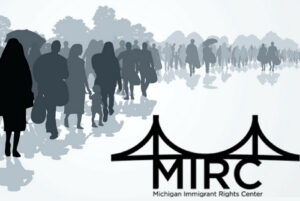 DETROIT, MI, October 8, 2024: A new analysis released by the Protecting Immigrant Families (PIF) coalition finds that state Medicaid eligibility policies and practices resulted in 22,935 people losing Medicaid in Michigan counties with larger immigrant shares of population, compared to counties with a lower share of immigrants. The analysis, completed for PIF by the non-profit behavioral science research firm ideas42, focuses on declines in Medicaid enrollment as states worked to “unwind” Medicaid’s pandemic-era continuous coverage requirement.
DETROIT, MI, October 8, 2024: A new analysis released by the Protecting Immigrant Families (PIF) coalition finds that state Medicaid eligibility policies and practices resulted in 22,935 people losing Medicaid in Michigan counties with larger immigrant shares of population, compared to counties with a lower share of immigrants. The analysis, completed for PIF by the non-profit behavioral science research firm ideas42, focuses on declines in Medicaid enrollment as states worked to “unwind” Medicaid’s pandemic-era continuous coverage requirement.
“State and federal failures to lower the barriers facing immigrant families have denied more than a million people health care access under Medicaid,” said PIF director Adriana Cadena. “And because immigrant families are largely families of color, these failures are widening racial health disparities.”
The PIF/ideas42 analysis compared state-published Medicaid enrollment data for counties with larger (as high as 36%) average immigrant shares of county population against disenrollments for counties with the smallest (averaging less than 4%) immigrant population shares. The analysis focused on states with relatively large immigrant shares of state population: Arizona, California, Colorado, Florida, Michigan, New Jersey, New York, North Carolina, Pennsylvania, and Texas. These 10 states include 50% of the total U.S. population and 68% of the foreign-born population. Most states were not included in the study because they did not report county-level data, so the nationwide impact is likely much greater than the 1.37 million people cited by the research.
“This research reflects what we consistently hear from immigrant families,” said Christine Sauvé, Policy and Communications Manager for the Michigan Immigrant Rights Center. “Foreign-born Michiganders encounter so many difficulties accessing benefits for which they are eligible, from lack of translation to fear of how it will affect their immigration status. We call on our state and federal government partners to take more proactive steps to ensure immigrant families aren’t left behind.”
The research finds a correlation between state Medicaid disenrollment and immigrant share of county population. Counties with the “highest” immigrant shares of county population accounted for about half (617,520 or 45%) of additional Medicaid coverage losses. Counties with a “high” immigrant share of county population accounted for an additional nearly 30% (383,119 or 28%).
“The inequitable unwinding of Medicaid is apparent in the numbers, when over 22,000 individuals in Michigan alone lost Medicaid coverage, disproportionately impacting immigrant communities. It is not surprising to see the major impact that losing coverage has on these immigrant households, when they have to worry about meeting their basic needs,” said Sara Ismail, State Policy Manager of the National Network for Arab American Communities (NNAAC).
“Our results indicate that high immigrant share communities have lost Medicaid coverage at substantially higher rates than counties with low immigrant shares. After an unprecedented increase in insurance coverage during the pandemic, more people today—especially in immigrant communities—face unnecessarily complex eligibility requirements and struggle to obtain and afford healthcare,” said Jeremy Barofsky, who led the analysis as Director of Research and Evaluation at ideas42.
The analysis also shows that Texas performed the worst at mitigating Medicaid coverage losses. In Texas, counties with the highest immigrant share had a drop in enrollment that was nearly five percentage points higher (totalling more than 460,000 people) than the counties with the lowest immigrant share. In California, this difference was only 2.5 percentage points.
Before Medicaid unwinding began, PIF developed a set of policy recommendations to mitigate known barriers to keeping eligible people in immigrant families covered. Subsequent research by PIF and partner organizations found that states had largely failed to implement these best practices. PIF shared its findings with the U.S. Centers for Medicare and Medicaid Services (CMS) in November, urging CMS to require states to address performance shortfalls.
“This research shows that states dropped the ball during Medicaid unwinding, costing more than a million people the health care every family needs,” said Cadena. “Our national and state leaders must not allow this abject failure to become the new normal.”
Immigrant families in Michigan who have questions about their rights can consult the resources developed by the Protecting Immigrant Families (PIF) Michigan Campaign or call MIRC at (734) 239-6863.
Michigan Immigrant Rights Center (MIRC) is a statewide legal resource center for Michigan’s immigrant communities that works to build a thriving Michigan where immigrant communities experience equity and belonging. MIRC’s work is rooted in three pillars: direct legal services, systemic advocacy, and community engagement and education. michiganimmigrant.org

